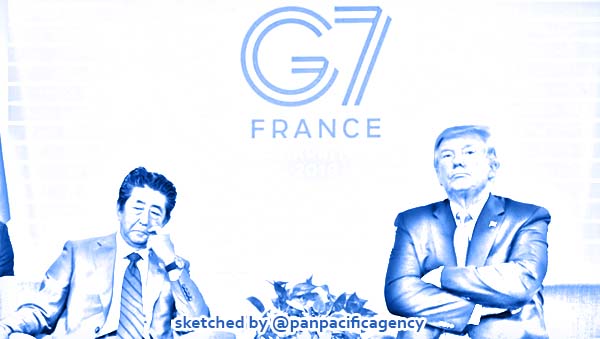Japan’s Nikkei logs biggest point fall in 30 yrs amid worsening virus fears

Japanese Prime Minister Shinzo Abe and U.S. President Donald Trump meeting at G-7. Photo by the Kyodo News. Sketched by the Pan Pacific Agency.
TOKYO, Mar 13, 2020, Kyodo. The benchmark Nikkei stock index on Friday morning saw its steepest one-day point decline since April 1990, losing more than 1,850 points, or 10 percent, to briefly trade below the 17,000 threshold amid escalating fears about the coronavirus outbreak, Kyodo News reported.
Despite the Bank of Japan’s offer to inject 500 billion yen ($4.8 billion) into the financial system through Japanese government bond purchases to cushion the economic impact of the viral outbreak, the Nikkei extended its losses throughout the morning. No component stock in the index was in positive territory.
The 225-issue Nikkei Stock Average ended morning trading 1,478.49 points, or 7.97 percent, down from Thursday at 17,081.14, its lowest intraday level since November 2016. The broader Topix index of all First Section issues on the Tokyo Stock Exchange fell 95.59 points, or 7.20 percent, to 1,232.29.
Decliners were led by mining, real estate and air transportation.
In the currency market, the dollar advanced against the yen and euro after the European Central Bank’s overnight decision to keep interest rates unchanged disappointed market players who had expected an attempt to curb the damage from the viral contagion, dealers said.
The dollar fetched 105.02-03 yen at noon, compared with 104.59-69 yen in New York and 103.66-68 yen in Tokyo at 5 p.m. Thursday.
The euro was quoted at $1.1208-1209 and 117.71-73 yen against $1.1182-1192 and 117.00-10 yen in New York and $1.1311-1313 and 117.25-29 yen in Tokyo late Thursday afternoon.
The sell-off in the Tokyo stock market followed another plunge on Wall Street overnight, with the Dow Jones Industrial Average posting its biggest percentage fall since the 1987 Black Monday crash on the U.S. travel ban for Europe amid concerns over the impact of the virus on global businesses, brokers said.
Many stocks remained untraded for the first 10 minutes after opening due to the massive number of sell orders.
“Panic was accelerating,” said Akira Tanoue, a senior strategist in the investment research department at Nomura Securities Co.
The market rout prompted the Ministry of Finance, Financial Services Agency and the BOJ to hold an emergency meeting to discuss the situation.
Sentiment was further dampened by U.S. President Donald Trump’s remark on Thursday that officials should consider postponing the 2020 Tokyo Olympic Games for one year.
On the TSE’s First Section, declining issues outnumbered advancers 2,158 to six, while one ended the morning unchanged.
Mining and oil-related issues took a beating on expectations a possible slowdown in global business activity will deteriorate demand. Inpex tumbled 89.50 yen, or 13.2 percent, to 588.90 yen, Sumitomo Metal Mining skidded 115.00 yen, or 5.2 percent, to 2,108.50 yen and Mitsubishi Materials was down 96 yen, or 5.0 percent, at 1,828 yen.
Among air transportation issues, Japan Airlines dropped 257.50 yen, or 11.7 percent, to 1,945.00 yen while ANA Holdings declined 234.50 yen, or 8.9 percent, to 2,408.00 yen.